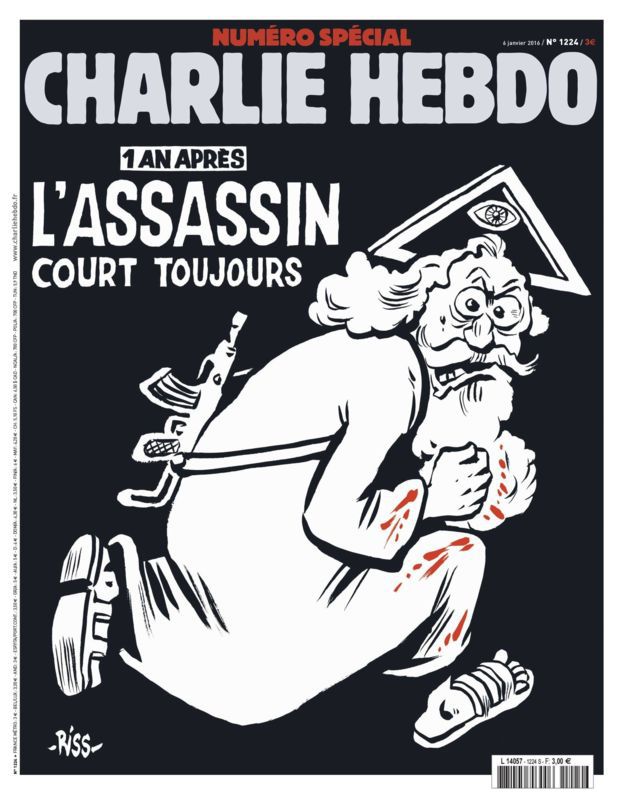One year after the Charlie Hebdo massacre in Paris that left 12 dead, the Vatican daily newspaper has condemned the French satirical paper’s anniversary cover which depicts God as an armed terrorist.
The illustration on the paper’s front cover “is insulting toward faithful of all religions,” Anouar Kbibech, President of the Conseil fran√ßais du culte musulman said in a Jan. 7 article in the Vatican newspaper L’Osservatore Romano.
“It is a caricature which is not at all helpful at a time when we need to stand by each other.”
On Jan.7, 2015, exactly one year ago, armed Muslim extremists stormed the Paris headquarters of French newspaper Charlie Hebdo, killing 12 people. They claimed the attacks avenged the cartoons printed in the publication that depicted offensive images of the Prophet Mohammed.
Hebdo’s cover for the one-year-anniversary of the tragedy uses Christian iconography to depict God as a terrorist covered in blood, who is running away with a Kalashnikov slung on his back. The title of the cover reads “L’assasin court toujours,” translating roughly as “the assassin is still at large.”
In the L’Osservatore Romano article, the Vatican said the decision to use this specific image begs the question: “is the kind of controversy France needs right now?”
France has been site of numerous terrorist attacks over the past year, the most recent of which was a series of coordinated attacks by Islamic terrorists in Paris Nov. 13 that left 129 people dead.
However, the Vatican said the cover choice is “nothing new,” and that behind their flag of “uncompromising secularism,” Hebdo has forgotten that religious leaders have for some time insisted that “using God to justify hatred constitutes true blasphemy,” as Pope Francis has often repeated.
Charlie Hebdo’s decision, they said, “illustrates the sad paradox of a world that is becoming so sensitive to political correctness it is verging on the ridiculous, but which doesn't want to recognize or respect the faith in God of every believer, whatever creed they profess.”
In comments to AdnKronos news agency, Bruno Forte, Archbishop of Chieto-Vasto and secretary-general of the Synod of Bishops, described the French weekly’s choice as “distressing, as well as unfounded.”
“It offends the sensitivity of all people, not only Christians, Jews or Muslims. It also offends those who despite not being believers sense how important it is to respect the religious conscience and dimension in life.”
The paper’s insinuations, he said, “are far from the truth, because all religions, not just Christianity, but also the Jewish and Muslim faiths, preach non-violence in the name of God. If anything, one shows violence by adopting an ideological stance, claiming to possess the truth, judging and excluding others.”
Charlie Hebdo is known for its provocative paper covers, and has a history printing such cartoons about the prophet Mohamed. In February 2006 it reprinted cartoons from the Danish newspaper Jyllands-Posten that provoked outrage among many Muslims; the newspaper’s offices were firebombed in November 2011 after publishing one cartoon of Mohammed.
In September 2012 the newspaper published cartoons showing Mohammed naked. The cartoon came at a time of violent protests over a low-budget film made in the U.S. that was insulting towards the founder of Islam.
Shortly after the last year’s massacre took place, Pope Francis commented on the incident, saying that killing in God’s name is never acceptable, but neither is insulting faith.
While on his way to the Philippines Jan. 15, 2015, the Pope held an in-flight news conference, during which he was asked by a French journalist if he saw freedom of expression as a fundamental human right.
In response, Francis said that “You cannot provoke. You cannot insult the faith of others. You cannot make fun of the faith.” If you do, he said, you “can expect a punch.”
On the other hand, he stressed that one “cannot kill in the name of God, This is an aberration. Killing in the name of God is an aberration against God. I think this is the main thing with freedom of religion. You can practice with freedom but without imposing or killing.”
He said that every person has not just the freedom or right, but also an obligation “to say what he thinks” in order to build the common good: “We have the obligation to freely have this liberty, but without offending.”

